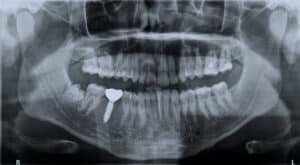Ensuring the long-term success of your dental implants is important for maintaining a healthy and confident smile. Unlike natural teeth, dental implants require specific care routines to prevent potential complications such as infections or bone loss.
Our comprehensive guide provides essential long-term care tips to guarantee your dental implants remain in optimal condition. From daily hygiene practices to scheduling regular dental check-ups, understanding and implementing these guidelines can significantly impact the durability and functionality of your dental implants.
By embracing a proactive approach to implant care and prioritizing your oral health, you can enjoy the benefits of a radiant, problem-free smile for many years to come. For personalized advice and expert care, trust BellaVista DentalCare.
Contact us today to ensure the longevity of your dental implants and to maintain optimal oral health.
Understanding Dental Implant Longevity
Dental implants are a popular choice for replacing missing teeth, lasting many years with the right care. They work by attaching to your jawbone and acting like the root of a tooth, which helps them feel and look like real teeth. To keep them lasting a long time, it’s important to follow good oral hygiene practices and visit your dentist regularly.
Lifespan Factors
Dental implants have a longevity that impresses many. The statistical success rate of implants at 20 years is 99%, depending on several factors.
Oral hygiene plays a crucial role in the lifespan of dental implants. Good oral care ensures implants last longer. Brushing twice daily and flossing are essential habits for implant care.
Material quality also affects longevity. High-quality materials can withstand wear better, extending an implant’s life.
Maintenance Importance
Regular professional maintenance is the key to long-term success with dental implants. Visiting your dentist regularly helps catch issues early. Some of the components of the restoration that lies on the implant need to be replaced over time.
Also, if bone loss is occurring, early intervention and treatment can aid in preventing failure of the implant. Dentists can spot signs of trouble before they worsen.
Professional cleanings also prevent plaque buildup around implants. This keeps the surrounding gums healthy and supports implant longevity.
Effective Oral Hygiene for Dental Implants
Taking care of dental implants is important to making sure they last a long time and keep your smile looking great. Just like natural teeth, implants need regular brushing, flossing, and cleanings at the dentist to stay healthy. By following these simple steps, you can protect your implants from problems and ensure they remain a strong part of your smile.
-
Proper Brushing
Using a soft-bristled toothbrush is crucial. It prevents scratches on your dental implants. These brushes are gentle on the gums, too.
You should brush twice a day. Morning and night routines help maintain oral health. This routine removes plaque without harming implant surfaces.
-
Suitable Toothpaste
Choose a non-abrasive fluoride toothpaste. Abrasive substances can damage implants over time. Fluoride supports enamel strength around the implant.
Avoid whitening pastes or those with baking soda. They can be too harsh on your implants and gums.
-
Interdental Cleaning
Interdental brushes reach where regular brushes can’t. They clean effectively around implants, preventing gum disease. Use these special brushes daily to remove food particles and plaque from hard-to-reach areas.
By following these tips – using soft-bristled toothbrushes, non-abrasive fluoride toothpaste, and interdental brushes – you ensure that both your dental implants and natural teeth remain healthy.
In addition to brushing and flossing, consider using a water flosser or an antimicrobial mouth rinse recommended by your dentist for comprehensive care. Remember, proper care of your dental implants starts with adopting effective oral hygiene habits tailored specifically to their needs.
Daily Care Routine for Dental Implants
Maintaining dental implants involves a daily care routine similar to that of natural teeth to ensure their longevity and health.
-
Brushing Habits
Brushing your teeth twice a day is necessary. It removes plaque and bacteria that can harm dental implants. Use a soft-bristle toothbrush to avoid scratching the surface of the implants.
It’s important not to skip morning or nighttime brushing. This routine keeps your mouth clean throughout the day and night.
-
Flossing Technique
Floss at least once a day with products made for implants. Traditional floss might not be as effective. Specialized floss can reach areas around implants better.
Remember, gentle motions are key when flossing around implants to prevent damage.
-
Mouthwash Choice
Use an alcohol-free antimicrobial mouthwash daily. Alcohol-based mouthwashes can dry out your mouth, which isn’t good for dental implant care.
Rinsing helps remove particles that brushing and flossing might miss. Make it a part of your oral hygiene routine.
Maintaining dental implants requires dedication but ensures their longevity and health. By following these simple yet effective steps, you safeguard not just your dental investments but also your overall oral health.
- Brush twice daily using a soft-bristle toothbrush.
- Floss once a day with implant-specific products.
- Rinse with an alcohol-free antimicrobial mouthwash regularly.
Adhering to this regimen will keep your smile bright and healthy for years to come.
Early Infection Detection for Dental Implants
Spotting infections early around dental implants is important for their long-term success and your overall oral health. Signs of infection can include redness, swelling, pain, or a feeling of looseness around the implant area.
Recognize Signs
To ensure the long-term success of dental implants, recognizing early signs of infection is crucial. Watch closely for redness, swelling, or bleeding around the implant site. These are clear indicators that something might be wrong.
Immediate action can prevent complications. If you notice any discomfort or these signs, it’s time to see your dentist.
Seek Help Early
A persistent bad taste or odor emanating from the mouth may also hint at an infection near your dental implant. This isn’t just unpleasant; it’s a signal that requires urgent attention. Consulting with a dentist at the first sign of discomfort ensures potential issues are addressed before they escalate.
Remember, early detection and treatment are the keys to avoiding serious problems down the line. Your oral health professional is there to help maintain the health and longevity of your dental implants.
Regular Dental Check-ups for Implant Care
Regular dental check-ups are vital for the care and maintenance of dental implants.These visits allow your dentist to monitor the health of your implants, ensuring they are functioning well and remain firmly in place.
Bi-Annual Visits
Dental implants require regular care to maintain their condition. Experts recommend visiting the dentist every six months. These visits are crucial for the professional cleaning and examination of your implants.
During these appointments, dentists use special instruments that do not damage the implant or surrounding bone. They remove plaque buildup, which is harmful to both natural teeth and replacement teeth. This preventive measure helps maintain oral health and prolongs the life of dental implants.
X-Ray Monitoring
X-rays play a significant role in implant care. They allow dentists to monitor the integrity of dental implants and check the bone health around them. By using X-rays, any changes or issues with the implant placement can be detected early.
Early detection through X-rays helps prevent major complications down the line. It ensures that minor problems are addressed before they escalate into more serious conditions requiring extensive treatment.
Early Issue Detection
Detecting issues early is the key to long-term care for dental implants. Regular check-ups enable dentists to identify potential risks or damages at an early stage.
This proactive approach minimizes risk factors such as infection spread from earlier stages, discussed previously, ensuring a healthy environment around both natural teeth and dental implants alike.
Smoking Cessation for Dental Implant Maintenance
Quitting smoking is essential for the maintenance and longevity of dental implants. Smoking can hinder the healing process after implant surgery and increase the risk of implant failure due to its negative effects on gum and bone health.
Risk of Failure
Smoking greatly increases the risk of dental implant failure. Nicotine in cigarettes restricts blood flow. This makes it hard for your body to heal around the new implant.
Quitting smoking can be tough, but it’s important for your dental health. Studies show that smokers have a higher rate of implant loss than non-smokers. The chemicals in the smoke also increase the chance of infection at the implant site.
Healing Process
Nicotine hinders healing by limiting blood flow to tissues. This slows down recovery after getting an implant. A well-healed site is crucial for an implant to succeed.
Quitting smoking boosts the success rate of dental implants significantly. Improved blood circulation helps your gums and bones heal better around the implant.
It’s clear that stopping smoking plays a critical role in caring for your dental implants long-term, just as regular check-ups do. Both actions work together to ensure your oral health remains optimal.
Maintaining Healthy Habits for Dental Implants
Keeping up with healthy habits is key to ensuring the longevity of dental implants. This means not only practicing good oral hygiene like brushing and flossing regularly but also adopting a lifestyle that supports overall oral health.
-
Avoid Hard Items
Dental implants are strong but not indestructible. Chewing on hard items like ice or candy can damage them. This leads to costly repairs or replacements.
Avoid these to ensure the longevity of your implants. A balanced diet benefits both your general health and oral hygiene, reducing risks to your dental work.
-
Wear Mouthguards
Sports increase the risk of impacts to your mouth. Wearing a mouthguard protects your dental implants during physical activities.
It cushions blows that could otherwise cause serious damage. Always use one during sports for peace of mind and implant safety.
-
Control Chronic Conditions
Chronic conditions such as diabetes affect oral health significantly. They can slow down the healing process and increase the risk of bone loss in the jaw bone.
Managing these conditions is important for implant success. Follow medical advice closely, maintain a healthy lifestyle, and keep regular check-ups with healthcare providers.
Dietary Considerations for Dental Implant Health
Choosing the right foods is important for the health of your dental implants. A diet rich in vitamins and minerals supports gum health and bone strength, which are vital for implant stability.
-
Nutrient-Rich Foods
Eating the right foods is necessary for dental implant health. Calcium and vitamin D are vital for bone strength. They help your jawbone support the implants.
Foods like milk, cheese, leafy greens, and fish are great sources of calcium. For vitamin D, consider eggs and fortified cereals. These nutrients work together to maintain implant stability.
-
Limit Harmful Intake
Sugary and acidic foods pose a risk to dental implants. They can cause decay around the implant area. It’s best to eat these foods in moderation.
Limit candies, sodas, and citrus fruits. These items can harm the protective layer around your implants. Opting for healthier snacks will benefit your oral health long-term.
-
Hydration Matters
Staying hydrated is essential for salivary production. Saliva keeps your mouth clean and helps prevent infections around implants.
Drink plenty of water throughout the day. This simple habit supports overall oral cleanliness. Avoid beverages that dehydrate you, like coffee or alcohol.
Final Thoughts
Dental implants offer a long-term solution for replacing missing teeth, promising both functionality and aesthetics. However, their longevity heavily depends on proper care and maintenance.
BellaVista DentalCare is here to support you every step of the way. From personalized oral hygiene advice to regular check-ups and professional guidance on lifestyle habits that benefit your dental health, our team is dedicated to helping you maintain your dental implants in top condition.
Don’t wait until issues arise; proactive care is key. Schedule your appointment with BellaVista DentalCare today and take the first step towards a lifetime of healthy smiles.
Frequently Asked Questions
-
How long do dental implants typically last?
Dental implants can last a lifetime with proper care, including effective oral hygiene and regular dental check-ups. Their longevity largely depends on maintaining good oral health.
-
What is the daily care routine for dental implants?
Daily care for dental implants should include brushing twice, flossing once, and using an interdental brush to clean around the implant and under the gum line to prevent plaque buildup.
-
How can I avoid infections with my dental implants?
To avoid infections, clean your dental implants thoroughly with recommended products, avoid smoking, maintain a healthy diet, and attend regular check-ups for early detection of potential issues.
-
What are the signs of early infection with dental implants?
Early signs of infection include discomfort or pain around the implant site, red or swollen gums, and bad breath or taste in the mouth. If you notice any of these symptoms, consult your dentist immediately.
-
How often should I have check-ups for my dental implant maintenance?
It’s advised to visit your dentist every 6 months for a professional cleaning and annual check-up to ensure your implant remains in good condition and to detect any potential problems early.
-
Can smoking affect my dental implant’s health?
Yes, smoking can significantly impact the health of your dental implants by increasing the risk of infection and delaying healing processes. Quitting smoking is highly recommended for maintaining implant durability.
-
Are there dietary considerations I should follow to maintain my dental implant health?
Yes. A balanced diet rich in vitamins C and D supports gum health while avoiding hard or sticky foods protects against physical damage. Also, staying hydrated promotes overall oral hygiene, which is essential for sustaining healthy implants.





